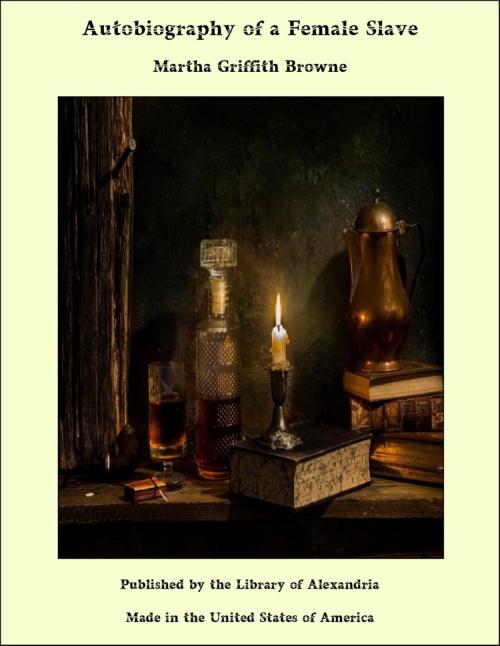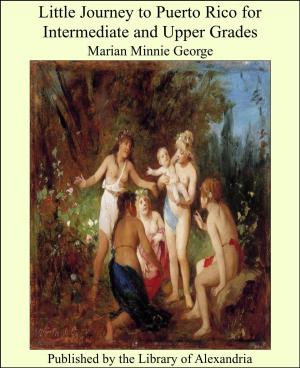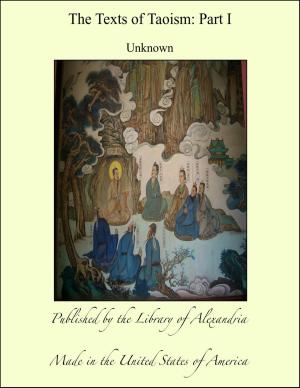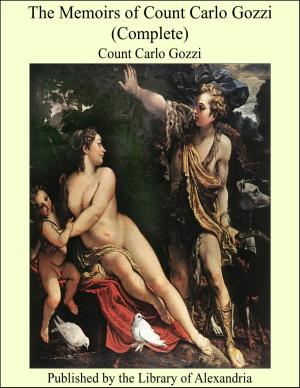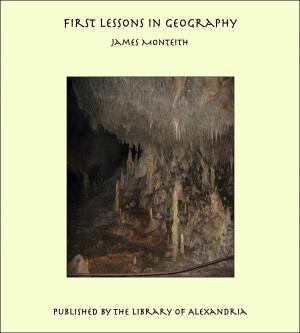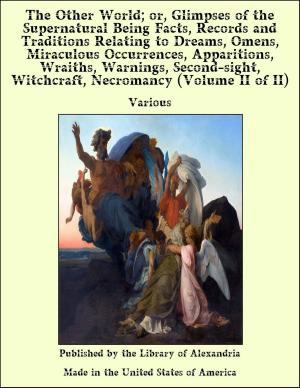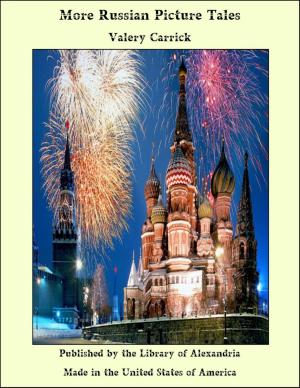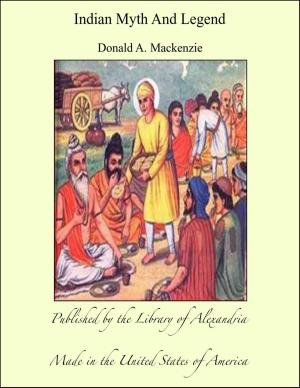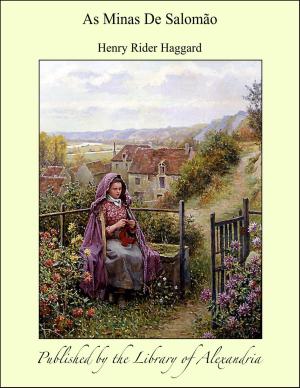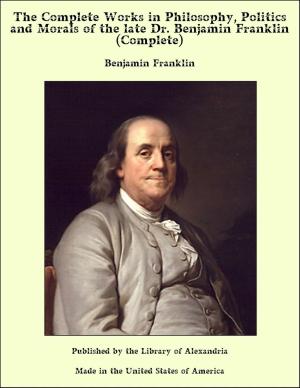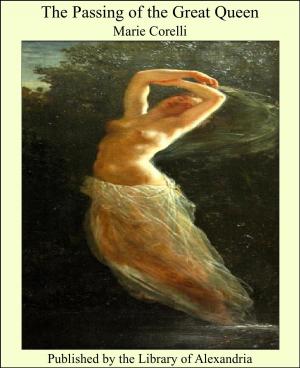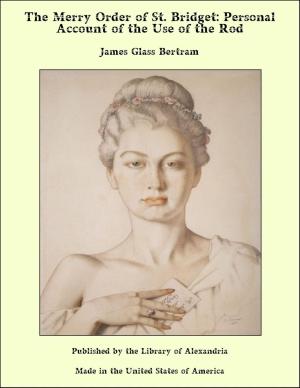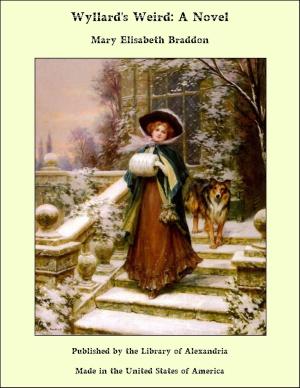Autobiography of a Female Slave
Nonfiction, Religion & Spirituality, New Age, History, Fiction & Literature| Author: | Martha Griffith Browne | ISBN: | 9781465617576 |
| Publisher: | Library of Alexandria | Publication: | March 8, 2015 |
| Imprint: | Language: | English |
| Author: | Martha Griffith Browne |
| ISBN: | 9781465617576 |
| Publisher: | Library of Alexandria |
| Publication: | March 8, 2015 |
| Imprint: | |
| Language: | English |
I was born in one of the southern counties of Kentucky. My earliest recollections are of a large, old-fashioned farm-house, built of hewn rock, in which my old master, Mr. Nelson, and his family, consisting of a widowed sister, two daughters and two sons, resided. I have but an indistinct remembrance of my old master. At times, a shadow of an idea, like the reflection of a kind dream, comes over my mind, and, then, I conjure him up as a large, venerable-looking man, with scanty, gray locks floating carelessly over an amplitude of forehead; a wide, hard-featured face, with yet a kindly glow of honest sentiment; broad, strong teeth, much discolored by the continued use of tobacco. I well remember that, as a token of his good-will, he always presented us (the slave-children) with a slice of buttered bread, when we had finished our daily task. I have also a faint reminiscence of his old hickory cane being shaken over my head two or three times, and the promise (which remained, until his death, unfulfilled) of a good "thrashing" at some future period. My mother was a very bright mulatto woman, and my father, I suppose, was a white man, though I know nothing of him; for, with the most unpaternal feeling, he deserted me. A consequence of this amalgamation was my very fair and beautiful complexion. My skin was no perceptible shade darker than that of my young mistresses. My eyes were large and dark, while a profusion of nut-brown hair, straight and soft as the whitest lady's in the land, fell in showery redundance over my neck and shoulders. I was often mistaken for a white child; and in my rambles through the woods, many caresses have I received from wayside travellers; and the exclamation, "What a beautiful child!" was quite common. Owing to this personal beauty I was a great pet with my master's sister, Mrs. Woodbridge, who, I believe I have stated, was a widow, and childless; so upon me she lavished all the fondness of a warm and loving heart. My mother, Keziah the cook, commonly called Aunt Kaisy, was possessed of an indomitable ambition, and had, by the hardest means, endeavored to acquire the rudiments of an education; but all that she had succeeded in obtaining was a knowledge of the alphabet, and orthography in two syllables. Being very imitative, she eschewed the ordinary negroes' pronunciation, and adopted the mode of speech used by the higher classes of whites. She was very much delighted when Mrs. Woodbridge or Miss Betsy (as we called her) began to instruct me in the elements of the English language. I inherited my mother's thirst for knowledge; and, by intense study, did all I could to spare Miss Betsy the usual drudgery of a teacher. The aptitude that I displayed, may be inferred from the fact that, in three months from the day she began teaching me the alphabet, I was reading, with some degree of fluency, in the "First Reader." I have often heard her relate this as quite a literary and educational marvel.
I was born in one of the southern counties of Kentucky. My earliest recollections are of a large, old-fashioned farm-house, built of hewn rock, in which my old master, Mr. Nelson, and his family, consisting of a widowed sister, two daughters and two sons, resided. I have but an indistinct remembrance of my old master. At times, a shadow of an idea, like the reflection of a kind dream, comes over my mind, and, then, I conjure him up as a large, venerable-looking man, with scanty, gray locks floating carelessly over an amplitude of forehead; a wide, hard-featured face, with yet a kindly glow of honest sentiment; broad, strong teeth, much discolored by the continued use of tobacco. I well remember that, as a token of his good-will, he always presented us (the slave-children) with a slice of buttered bread, when we had finished our daily task. I have also a faint reminiscence of his old hickory cane being shaken over my head two or three times, and the promise (which remained, until his death, unfulfilled) of a good "thrashing" at some future period. My mother was a very bright mulatto woman, and my father, I suppose, was a white man, though I know nothing of him; for, with the most unpaternal feeling, he deserted me. A consequence of this amalgamation was my very fair and beautiful complexion. My skin was no perceptible shade darker than that of my young mistresses. My eyes were large and dark, while a profusion of nut-brown hair, straight and soft as the whitest lady's in the land, fell in showery redundance over my neck and shoulders. I was often mistaken for a white child; and in my rambles through the woods, many caresses have I received from wayside travellers; and the exclamation, "What a beautiful child!" was quite common. Owing to this personal beauty I was a great pet with my master's sister, Mrs. Woodbridge, who, I believe I have stated, was a widow, and childless; so upon me she lavished all the fondness of a warm and loving heart. My mother, Keziah the cook, commonly called Aunt Kaisy, was possessed of an indomitable ambition, and had, by the hardest means, endeavored to acquire the rudiments of an education; but all that she had succeeded in obtaining was a knowledge of the alphabet, and orthography in two syllables. Being very imitative, she eschewed the ordinary negroes' pronunciation, and adopted the mode of speech used by the higher classes of whites. She was very much delighted when Mrs. Woodbridge or Miss Betsy (as we called her) began to instruct me in the elements of the English language. I inherited my mother's thirst for knowledge; and, by intense study, did all I could to spare Miss Betsy the usual drudgery of a teacher. The aptitude that I displayed, may be inferred from the fact that, in three months from the day she began teaching me the alphabet, I was reading, with some degree of fluency, in the "First Reader." I have often heard her relate this as quite a literary and educational marvel.
